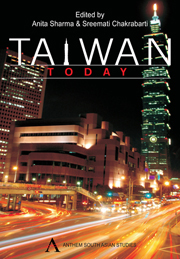Book contents
- Frontmatter
- Contents
- Acknowledgements
- Contributors to this Volume
- Acronyms and Abbreviations
- Foreword
- Introduction
- 1 Who are We? Identity in Transition
- 2 Taiwan: Yearning for an Identity
- 3 The Implications of Direct Flights: Beijing in Taiwanese Politics
- 4 Kuomintang, Democratization and the One-China Principle
- 5 The Deepening and Consolidation of Democracy in Taiwan
- 6 India and Taiwan: Bolstering Complementarity in Information Technology
- 7 Asian Regional Economic Integration and Taiwan–India Economic Relations
- 8 The Taiwan Factor in Sino–Indian Relations
- 9 Japan's Triumphant Diplomacy in Taiwan in 1874
- 10 A Study of the Cultural and Educational Exchanges between Taiwan and India, 1995–2006
- 11 Between Two Worlds: A Survey of Education in Taiwan
- 12 Female Immigrants, Social Capital and Public Sphere in Taiwan
- 13 Information Technology and Gender: Taiwan and India
- 14 Tzu Chi: A Case Study of Engaged Buddhism in Taiwan
- 15 Master Hsing Yun of Fo Guang Shan and the Development of Humanistic Buddhism
- 16 The Heritage and Innovation of Chan Paintings in Taiwan
- 17 Taiwan in World Architecture: A Historical Perspective
- Afterword
14 - Tzu Chi: A Case Study of Engaged Buddhism in Taiwan
Published online by Cambridge University Press: 05 March 2012
- Frontmatter
- Contents
- Acknowledgements
- Contributors to this Volume
- Acronyms and Abbreviations
- Foreword
- Introduction
- 1 Who are We? Identity in Transition
- 2 Taiwan: Yearning for an Identity
- 3 The Implications of Direct Flights: Beijing in Taiwanese Politics
- 4 Kuomintang, Democratization and the One-China Principle
- 5 The Deepening and Consolidation of Democracy in Taiwan
- 6 India and Taiwan: Bolstering Complementarity in Information Technology
- 7 Asian Regional Economic Integration and Taiwan–India Economic Relations
- 8 The Taiwan Factor in Sino–Indian Relations
- 9 Japan's Triumphant Diplomacy in Taiwan in 1874
- 10 A Study of the Cultural and Educational Exchanges between Taiwan and India, 1995–2006
- 11 Between Two Worlds: A Survey of Education in Taiwan
- 12 Female Immigrants, Social Capital and Public Sphere in Taiwan
- 13 Information Technology and Gender: Taiwan and India
- 14 Tzu Chi: A Case Study of Engaged Buddhism in Taiwan
- 15 Master Hsing Yun of Fo Guang Shan and the Development of Humanistic Buddhism
- 16 The Heritage and Innovation of Chan Paintings in Taiwan
- 17 Taiwan in World Architecture: A Historical Perspective
- Afterword
Summary
INTRODUCTION
Master Cheng Yen's Tzu Chi (Buddhist Compassion) appears to be the most successful experimentation in Socially Engaged Buddhism (SEB) not only because it is run by a woman in Taiwan, but also because it has further humanized and indigenized Taiwanese Buddhism. Tzu Chi manifests itself as Engaged Buddhism's response to globalization: it adapts its efforts to globalization and hence brings Buddhist symbols to the global arena. SEB refers to active involvement of Buddhists in society and its problems. Participants in this movement seek to implement and actualize the traditional Buddhist ideals of wisdom and compassion in the modern world. In other words, SEB applies these ideals to social issues of peace and justice, environmental degradation, human and animal rights, community building and the provision of care to those in need. Such an application has been carried out quite successfully by Sulak Sivaraksa in Thailand, Ariayratane in Sri Lanka, Thich Nhat Hanh in Vietnam and France and Master Cheng Yen in Taiwan.
The Buddhist Compassion Tzu Chi Foundation, (known in short as Tzu Chi) was founded by Master Cheng Yen in 1966. It is a voluntary, non-governmental, non-profit, non-sectarian, non-political lay Buddhist organization under monastic leadership. Instead of spending time on prayers, burning incense, or reading sutras, Master Cheng Yen exhorts her disciples, to ‘humanize Buddhism’ by ‘just doing it’. She claims that the Buddhism practiced and preached by her is the original form of Buddhism, which is simple and down-to-earth.
- Type
- Chapter
- Information
- Taiwan Today , pp. 188 - 204Publisher: Anthem PressPrint publication year: 2010



